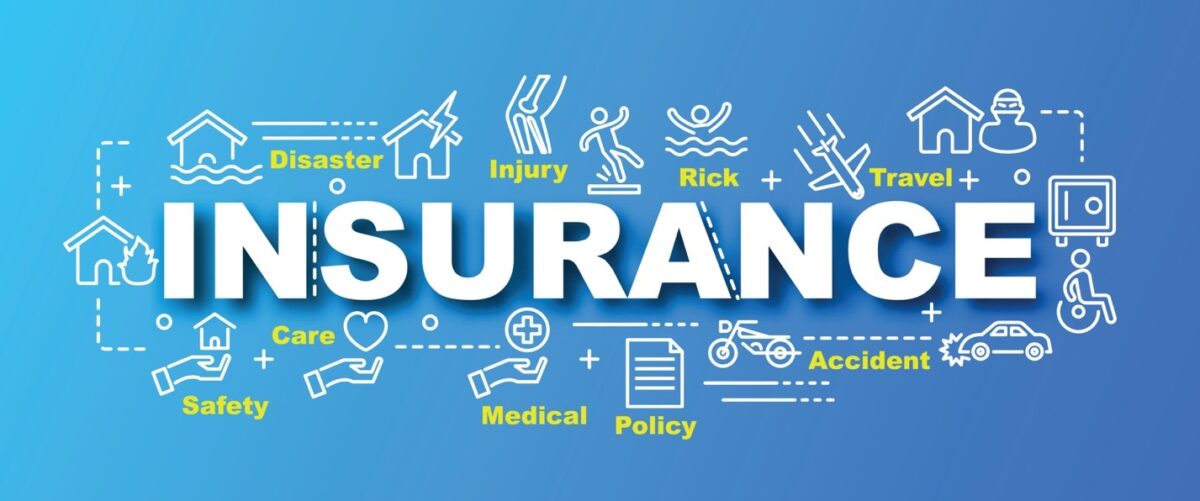Table of Contents
Overview
The term ‘Outstanding Balance’ is quite familiar, particularly to credit card users. Credit cards are a widely utilized payment facility, valued for their practicality and the ease they bring to transactions.
Just as with other financial services, it is crucial for users to have a good understanding of the various terms associated with credit cards. This knowledge is important to avoid misunderstandings and issues that can arise from using this payment method.
What is Outstanding Balance?
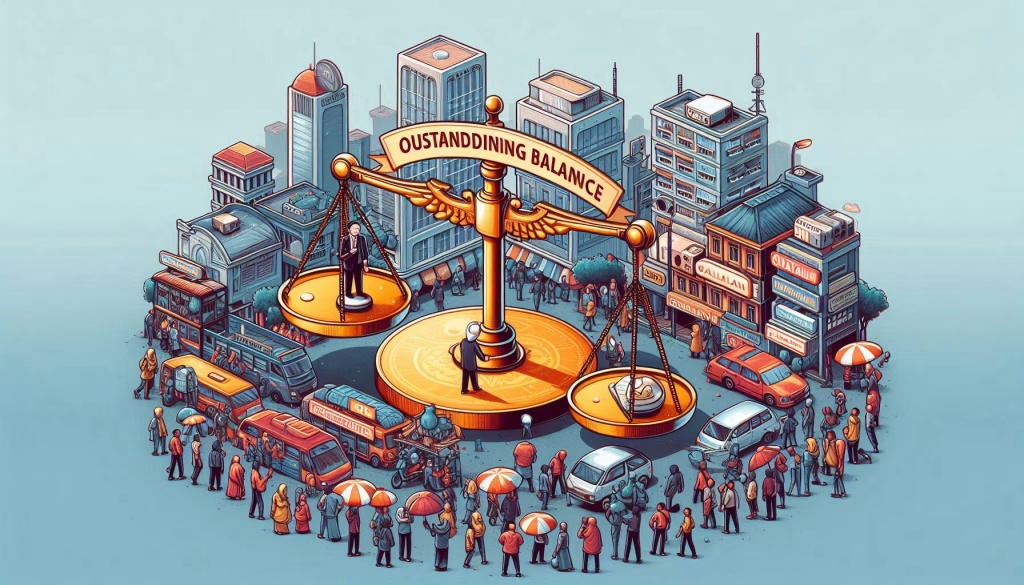
The outstanding balance refers to the total amount of debt or unpaid bills on a credit card. Essentially, it represents the remaining balance on the credit card that the user has yet to settle in full.
The outstanding balance referred to above can be understood as a debt balance resulting from partial payments by credit card users, whether they make only the minimum payment or an amount that is less than the total bill due.
This debt typically accumulates with various other components, such as upcoming expenses, interest, and additional charges. The outstanding balance will influence the total amount billed by the credit card issuing bank in the subsequent month.
Besides impacting the upcoming month’s bill amount, the outstanding balance also lowers the available credit limit on the card. A higher outstanding balance results in a larger bill the following month and a correspondingly reduced credit limit.
Considering that outstanding credit can lower credit card limits and potentially increase debt levels, this factor must be carefully managed. It is particularly crucial for credit card holders who aim to preserve and enhance their credit ratings.
The credit card limit changes with each transaction made on the card. The remaining balance can be determined by subtracting the amount of outstanding credit from the initial credit limit.
What are the Outstanding Balance Impacts?
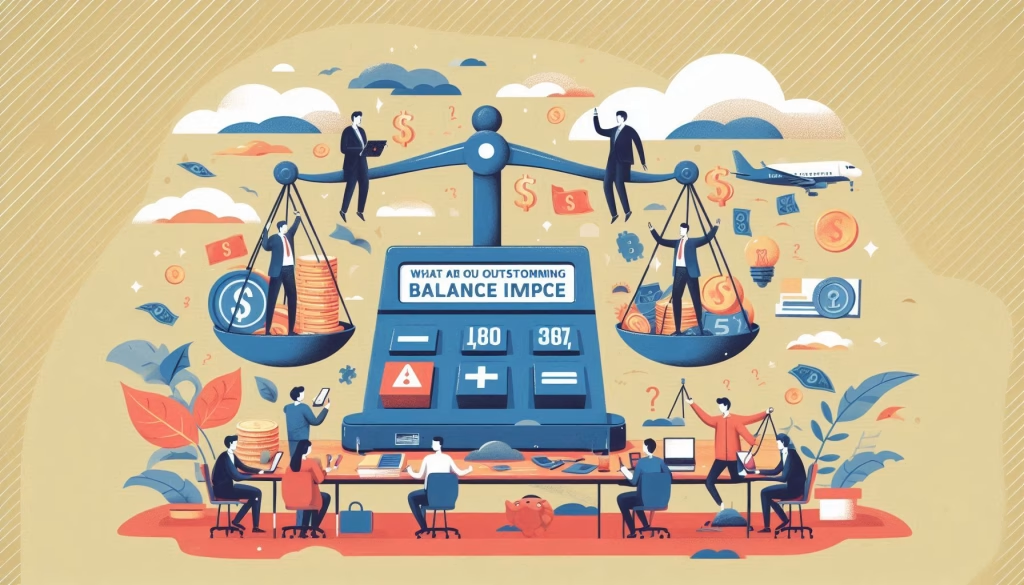
Outstanding balances can significantly impact a business’s financial health and operational efficiency. They can affect liquidity, working capital, and trust in business relationships, often leading to increased borrowing costs and strained ties with clients and partners. Additionally, high outstanding balances can influence credit scores, interest rates, and overall financial stability, making their management crucial for personal and business finance.
Paying less than the full amount on a credit card bill will undoubtedly increase the bill’s value in the subsequent month. This practice is risky and can lead to a ballooning outstanding balance, making it increasingly challenging for credit card users to pay off their debt.
The Impacts of Outstanding Credit

The impacts of outstanding credit are crucial for credit card users, as they can significantly affect financial health and overall well-being. Understanding these impacts is essential for managing credit responsibly and avoiding potential pitfalls. This article will explore the various consequences of outstanding credit, including interest accumulation, credit score implications, financial stress, and strategies to prevent and manage outstanding balances.
The impacts of outstanding credit are crucial for credit card users to understand thoroughly:
The Impacts of Outstanding Credit No.1
InsuranceWhat.com
Interest Fee
Interest costs directly result from an outstanding balance on credit cards. If the credit card bill is not fully paid, the issuing bank will charge a specified interest rate on the remaining amount in the subsequent month.
The interest rates on credit cards are typically high, which can significantly increase the total bill amount. This is an important factor for credit card users to consider.
The Impacts of Outstanding Credit No.2
InsuranceWhat.com
Interest Accumulation
One of the most immediate impacts of outstanding credit is the accumulation of interest. When credit card users carry a balance from month to month, they are charged interest on the remaining amount. This interest can quickly add up, especially if the credit card has a high annual percentage rate (APR). Over time, the interest can become a significant financial burden, making it more challenging to pay off the original debt. To avoid this, it is crucial to pay off the balance in full each month or at least make more than the minimum payment to reduce the principal amount.
The Impacts of Outstanding Credit No.3
InsuranceWhat.com
Credit Score Implications
Outstanding credit can also have a substantial impact on a user’s credit score. Credit utilization, which is the ratio of outstanding credit to the total credit limit, is a critical factor in determining credit scores. High credit utilization can indicate to lenders that the user is over-reliant on credit, which can lower their credit score. A lower credit score can make it more difficult to obtain new credit, secure favorable interest rates, and even affect employment opportunities in some cases. To maintain a healthy credit score, it is advisable to keep credit utilization below 30% of the total credit limit.
Allowing an outstanding balance to accumulate can negatively impact a credit card user’s credit score. The calculation of the credit score takes into account various factors, one of which is the credit utilization ratio. This ratio compares the amount spent to the credit limit granted by the bank.
A high credit utilization ratio can negatively affect the credit score. Consequently, a substantial outstanding balance on a credit card may further deteriorate the credit score.
The Impacts of Outstanding Credit No.4
InsuranceWhat.com
Financial Stress
Carrying outstanding credit can lead to significant financial stress. The burden of debt can cause anxiety and affect mental health, leading to a decrease in overall well-being. Financial stress can also strain relationships and impact other areas of life, such as work performance and personal happiness. It is essential to address outstanding credit proactively to reduce stress and improve financial stability. Creating a budget, setting financial goals, and seeking professional advice can help manage and alleviate financial stress.
Essentially, an outstanding balance can strain a credit card holder’s finances, particularly for those accustomed to making only the minimum payment each month. The minimum payment is the least amount that credit card users are required to pay.
The minimum payment amount is quite modest, typically ranging from 5% to 10% of the total bill, based on the policyPolicy The policy is a binding agreement and is agreed upon by the insurance company and policyholder in writing. An agreement made by the policyholder with an insurance company. of the credit card issuer. Nonetheless, paying only the minimum will result in a larger outstanding balance.
Strategies to Prevent and Manage Outstanding Balances

An outstanding balance can significantly impact and pose risksRisk Risk is a loss that occurs to the insured individual or object. Various bad possibilities could happen to someone. to a credit card user’s finances. It is tied to the cardholder’s capacity to manage the various bills incurred from using their credit card.
Considering the numerous consequences that an outstanding balance can have, it is crucial to prevent them. Credit card users should be well-informed about the proper use of credit cards, which includes understanding how to avoid the occurrence of outstanding balances.
Preventing and managing outstanding credit balances requires a proactive approach and disciplined financial habits. Here are some strategies to consider:
Strategies to Prevent and Manage Outstanding Balances No.1
InsuranceWhat.com
Create a Budget
Establishing a budget helps track income and expenses, ensuring that spending remains within limits. A budget can also identify areas where expenses can be reduced, freeing up funds to pay off outstanding credit.
Strategies to Prevent and Manage Outstanding Balances No.2
InsuranceWhat.com
Pay More Than the Minimum
Making only the minimum payment on credit card balances can lead to prolonged debt and higher interest costs. Paying more than the minimum amount each month can significantly reduce the outstanding balance and the total interest paid over time.
Strategies to Prevent and Manage Outstanding Balances No.3
InsuranceWhat.com
Use Credit Wisely
Limiting credit card use to essential purchases and avoiding impulsive spending can help prevent the accumulation of outstanding credit. It is also beneficial to use credit cards with lower interest rates and favorable terms.
Another method to prevent an outstanding balance is to use the credit card judiciously. It’s crucial to make informed decisions when utilizing a credit card to ensure that this payment method yields the greatest benefits.
Utilize credit cards solely for essential needs and refrain from unplanned and purely consumptive usage.
Strategies to Prevent and Manage Outstanding Balances No.4
InsuranceWhat.com
Pay the Bill in Full
The simplest method to prevent an outstanding balance is to consistently pay off the full amount of the credit card statement. Cultivate the discipline to settle your credit card bills in full each month.
Paying credit card bills in full each month ensures that no outstanding balance carries over, thereby preventing the riskRisk Risk is a loss that occurs to the insured individual or object. Various bad possibilities could happen to someone. of accruing debt.
Strategies to Prevent and Manage Outstanding Balances No.5
InsuranceWhat.com
Set Up Automatic Payments
Setting up automatic payments for credit card bills ensures that payments are made on time, avoiding late fees and additional interest charges. This can also help maintain a positive payment history, which is crucial for a good credit score.
Strategies to Prevent and Manage Outstanding Balances No.6
InsuranceWhat.com
Seek Professional Advice
If managing outstanding credit becomes overwhelming, seeking advice from a financial advisor or credit counselor can provide valuable insights and strategies. These professionals can help create a debt repayment plan and offer guidance on improving financial health.
Strategies to Prevent and Manage Outstanding Balances No.7
InsuranceWhat.com
Selecting and Utilizing the Appropriate Credit Card
Besides the points mentioned earlier, selecting the appropriate credit card can also aid in preventing an outstanding balance. The ideal credit card offers optimal and beneficial financial advantages, making it easier to fully utilize its features.
Today, a variety of credit cards are available for consideration. It’s crucial to select the type that best fits your needs.
How to Find Out Outstanding Balance?
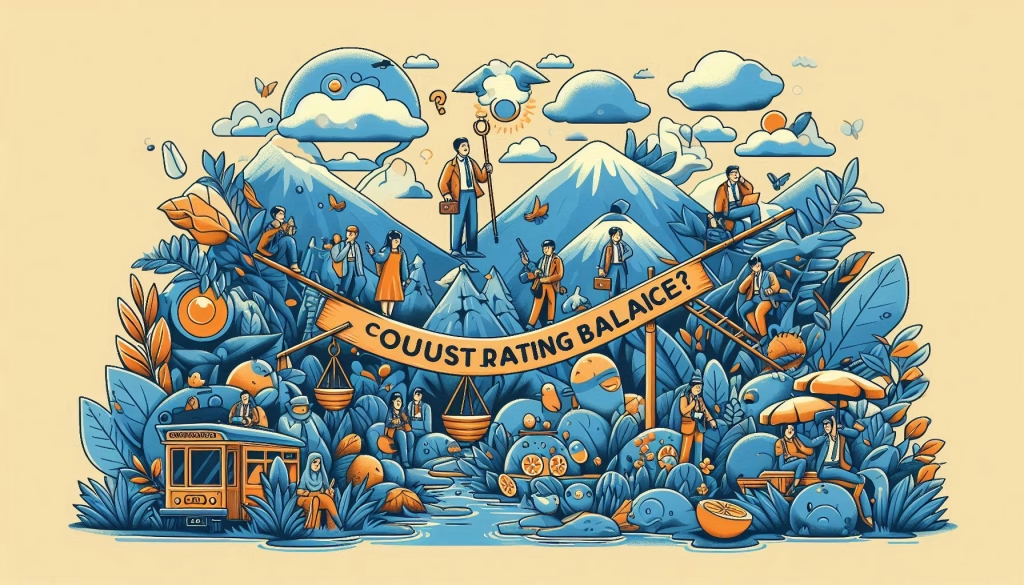
The outstanding balance is crucial information for credit card holders, particularly for those who frequently make only the minimum payments or fail to settle the entire credit card bill each month.
Credit card users often require outstanding balance information to track their credit card usage details. Additionally, this information is crucial when they wish to determine the remaining credit limit on their card.
Finding out your outstanding balance is crucial for managing your finances effectively. Whether it’s a credit card, loan, or utility bill, knowing your outstanding balance helps you stay on top of your payments and avoid unnecessary fees. This article will guide you through the steps to find out your outstanding balance and provide tips on managing it efficiently.
Steps to Find Out Your Outstanding Balance
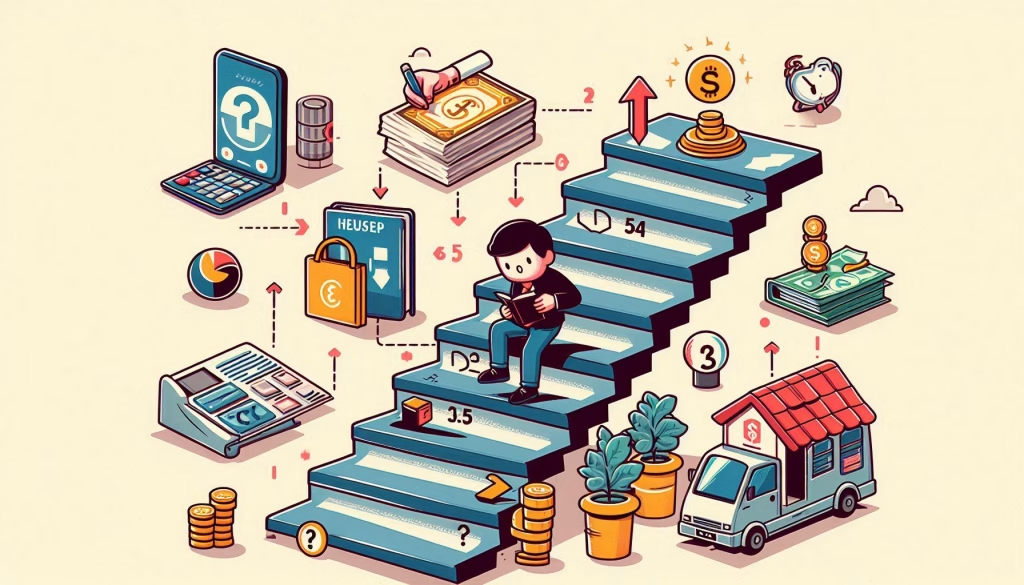
Here are steps to determine the outstanding balance amount:
Steps to Find Out Your Outstanding Balance No.1
InsuranceWhat.com
Check Your Statements
The most straightforward way to find out your outstanding balance is to check your monthly statements. Credit card companies, banks, and utility providers send statements that detail your balance, due date, and any recent transactions. You can receive these statements via mail or email, depending on your preference.
Steps to Find Out Your Outstanding Balance No.2
InsuranceWhat.com
Leverage the Application
Credit card users can ascertain their outstanding balance by directly accessing their credit card account. This can be accomplished online or via a dedicated application provided by the issuing bank.
Nearly all banks that issue credit cards now offer easily accessible online application services, allowing credit card users to conveniently obtain all necessary information and fulfill their requirements.
Steps to Find Out Your Outstanding Balance No.3
InsuranceWhat.com
Online Banking and Mobile Apps
Most financial institutions offer online banking services and mobile apps that allow you to check your outstanding balance anytime, anywhere. Simply log in to your account, navigate to the relevant section (e.g., credit card, loan, or utility bill), and view your current balance. These platforms often provide additional features, such as transaction history and payment options.
Steps to Find Out Your Outstanding Balance No.4
InsuranceWhat.com
Contacting the Call Center
Besides using the app, you can check your outstanding balance by reaching out to the call center of the bank that issued your credit card. The call center number is typically located on the back of your credit card. Be aware that you should have sufficient phone credit, as this service may incur charges.
If you prefer speaking to a representative, you can call the customer service number provided by your financial institution or service provider. They can give you up-to-date information on your outstanding balance and answer any questions you may have. Make sure to have your account details handy for verification purposes.
Steps to Find Out Your Outstanding Balance No.5
InsuranceWhat.com
Automated Phone Systems
Many banks and service providers have automated phone systems that allow you to check your balance without speaking to a representative. Follow the prompts to enter your account information and listen to the recorded message detailing your outstanding balance.
Steps to Find Out Your Outstanding Balance No.6
InsuranceWhat.com
Email and SMS Alerts
Sign up for email or SMS alerts from your financial institution or service provider. These alerts can notify you of your outstanding balance, due dates, and any recent transactions. This way, you can stay informed without having to log in to your account frequently.
The Conclusion
Identifying and Preventing Credit Card Outstanding Balances
An outstanding balance refers to the unpaid debt on a credit card. This balance can lead to several adverse effects for the cardholder. Proper understanding and management of outstanding balances are crucial to ensure the smooth operation of credit card usage and payments.
Finding out your outstanding balance is a crucial step in managing your finances effectively. By checking your statements, using online banking, contacting customer service, and utilizing other available resources, you can stay informed about your financial obligations. Additionally, implementing strategies such as setting up automatic payments, creating a budget, and seeking professional advice can help you manage your outstanding balance and maintain good financial health.
Do you think you have other ideas about Understanding Outstanding Balances: Definition and Impact? You can comment and share your thoughts below, or discuss more in the InsuranceWhat Forum. Also, read more articles about GLOBAL INSURANCE or other interesting insurance topic articles only at InsuranceWhat.com.





